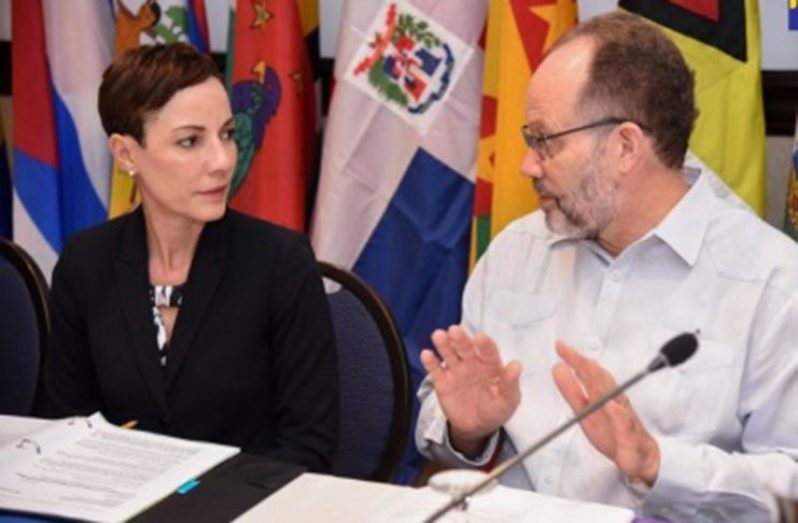KINGSTON, Jamaica, Apr 16, CMC – The Caribbean Forum (CARIFORUM) has formally launched negotiations with the European union for a CARIFORUM/EU Regional Protocol which will form an integral part of an African Caribbean and pacific (ACP)-EU Post-Cotonou Agreement.
“We are looking forward to negotiating a modern, relevant and meaningful arrangement as part of our future relations between CARIFORUM and the EU, always mindful that the regional protocols will be implementation instruments of the Foundation Agreement,” said CARIFORUM Secretary General, Irwin LaRocque. “The success of these negotiations will be measured by its ability to improve the lives of the people for whose benefit we are conducting them,” he told the launch that was attended by Neven Mimica, the Commissioner for International Cooperation and Development and Chief Negotiator European Commission.”
The Cotonou Agreement is a treaty between the EU and the ACP that was signed in June 2000 in Cotonou, Benin’s largest city. It entered into force in 2003 and was subsequently revised in 2005 and 2010. It is regarded as the most comprehensive partnership agreement between developing countries and the EU and in 2010, ACP-EU cooperation has been adapted to new challenges such as climate change, food security, regional integration, state fragility and aid effectiveness.
The fundamental principles of the Cotonou Agreement include equality of partners, global participation, dialogue and regionalisation. The agreement is re-examined every five years. The first round of negotiations on a successor accord to the Cotonou Agreement began late last year. LaRocque told the audience that included the ACP Secretary General Dr. P.I, Gomes and the ACP chief negotiator, Professor Robert Dussey, on Monday evening, that in addition to the long-standing historical ties, CARIFORUM states share common principles and values with the European Union.
He said these include respect for the Rule of Law, Human Rights and Principles of Good Governance. “These principles and values are the foundation upon which the CARIFORUM/EU relationship and indeed the ACP/EU relationship, have been built, maintained and nurtured since 1975, on the occasion of the First Lomé Convention. These are the ties that bind us.“
LaRocque, who is also the Secretary General of the 15-member regional integration grouping, CARICOM, said that the EU is one of the region’s most valued partners, adding “it is with appreciation for the quality of this historical relationship which we already share, that we approach these negotiations.
“We are embarking on an ambitious programme which involves two sets of simultaneous negotiations. While it is important that we progress equally on both fronts, it is equally important to note that the Regional Protocol cannot be finalised before completion of the Foundation Agreement. This is to ensure consistency and policy coherence.”
LaRocque said that the negotiations present an opportunity to forge an agreement to reflect changing times, new challenges and current developments. “In so doing we must take into account global realities and developments. These include the Paris Agreement on Climate Change and the 2030 Agenda for Sustainable Development.
“We must also take into account the increasing economic, social, climatic and environmental vulnerabilities of CARIFORUM states; their high level of per capita debt; the difficulties they continue to experience in financing their own development; and their desire to build resilience to those vulnerabilities.”
LaRocque said that the negotiations will be centred on a number of strategic priority areas including regional integration and co-operation which is a fundamental element of the development policies. “While the event today is a launch and not a negotiating session, it is my understanding that the issue of taxation may be proposed for inclusion under the heading of good governance. I wish to sound a word of caution, since this is currently a contentious issue that could strain an otherwise solid relationship.”
The Dominican-born top regional public servant said that the recent experience of the blacklisting of a number of CARICOM countries by Europe “has caused reputational damage. “We are open to dialogue on any issue but the unilateral actions of blacklisting has not been subject to the kind of dialogue that has informed our relationship over the years. For us taxation is not a good governance issue but an economic one. The determination of our tax rate, once it is transparent and devoid of corruption is a matter of fiscal policy which is our sovereign right.”
LaRocque said there are agreed and accepted global standards for tax good governance, driven by a globally recognized international standard setter, the Organisation of Economic Cooperation and Development (OECD), adding “this where that discussion belongs.
CARIFORUM includes the 15-member CARICOM states and the Dominican Republic. In her remarks, Foreign Affairs and Foreign Trade Minister Kamina Johnson Smith, said the Cotonou Agreement, which has defined “the political, economic, and development parameters of the partnership between our group of states, must now also be modernised to the benefit of both the (ACP and EU)”.
She said that in the context of an evolving global environment, the new agreement that is now being negotiated will need to be aligned with the current realities of ACP developing countries and anchored in the implementation of Agenda 2030 and its sustainable development goals. “We should not lose sight of the fact that this regional consultation is the start of the ongoing wider ACP negotiations with the EU. Over the last six months the ACP has completed two rounds of negotiations with the European Union on the foundation of the post Cotonou Agreement,” Johnson Smith said.
“It is our expectation that the eventual agreement will be forward-looking and aspirational in outlook. Forming a new partnership with the EU with the interest of developing countries will be placed squarely at the forefront,” she added. “We continue to advocate for an agreement that maintains a sustainable and predictable financing mechanism, thereby ensuring the continuity of viable projects within member countries of the ACP that are instrumental in sustaining the economic viability of the small states of the region,” she told the ceremony.





.jpg)








